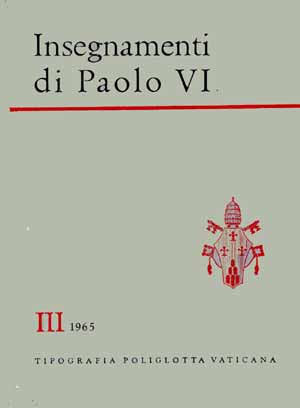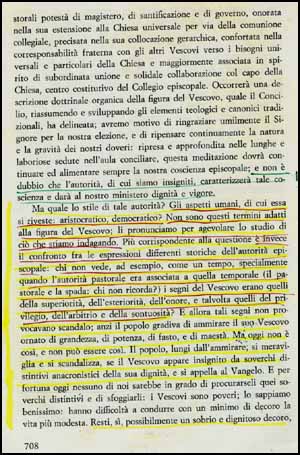Alleging that he wanted to avoid giving scandal to the people, Paul VI continuously took measures that went against the sacrality of the Church. This attitude is clear in the document reproduced below. In it he commanded the Bishops to change their lifestyle. He addressed this topic in a speech to the Italian Bishops on December 6, 1965, one day before the closing session of Vatican II.
At right, the cover of The Teachings of Paul VI, below right, photocopies of the official text in Italian published by the Vatican printing house; below left, our translation of the texts highlighted in yellow.
What is the style of episcopal authority today? How is the human aspect that clothes it: Aristocratic? Democratic? These terms are inadequate for the figure of a Bishop. We use them just to make the topic we are addressing more understandable. A more appropriate way to answer this question is look at different historical expressions of episcopal authority.
Who does not recall, for example, that in times past - especially when episcopal authority was associated with temporal authority (the crosier and the sword) - the signs of a Bishop were those of superiority, external riches, honor and, at times, privilege, arbitrary behavior and sumptuousness? In those times, such signs did not give rise to scandal. Then the people liked to admire their Bishop adorned with grandeur, power, riches and majesty.
Today, however, this is not the case, nor should it be so. Far from admiring, people are surprised and scandalized when a Bishop appears with the signs of those excessive and anachronistic symbols of his dignity. This people, then, appeals to the Gospel. ... There can still remain a sober and dignified decorum - the office demands it. But let us thank God that we have put aside all of the worldly and exterior things!"
(Paul VI, Speech to the Italian Bishops, December 6, 1965, Insegnamenti di Paolo VI, Tipografia Poliglota Vaticana, 1965, vol. 3, pp. 708-709)
|



|
|
